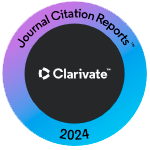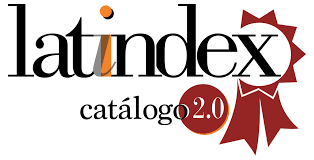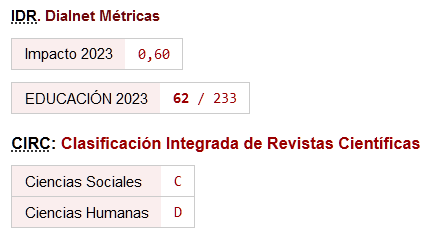Clima organizacional y su impacto en la calidad educativa universitaria
DOI:
https://doi.org/10.46661/ijeri.4803Palabras clave:
Clima organizacional, Calidad Educativa, Educación Superior, Gestión educativa, Satisfacción alumnosResumen
El compromiso social de las instituciones de educación superior de contribuir al desarrollo y bienestar de las sociedades lo cumple a través del perfil académico de sus egresados, lo cual implica la puesta en marcha de múltiples actividades inherentes a sus funciones sustantivas como la docencia e investigación pero también otras encaminadas a la evaluación a través de sus indicadores. Sin embargo, se reconoce que existen factores psicológicos y sociológicos que inciden en el comportamiento de los diversos agentes universitarios con la respectiva repercusión en la calidad educativa. Por ello, el objetivo de la presente investigación fue evaluar el clima organizacional en la Escuela Maya de Estudios Agropecuarios de la Universidad Autónoma de Chiapas en México y su impacto en el Sistema de Gestión de Calidad Institucional. La muestra para sustentar el estudio fue de 111 actores educativos. El enfoque de la investigación fue mixto y la validez de los instrumentos se realizó a través del Coeficiente Alfa de Cronbach cuyos resultados en las dimensiones de análisis oscilaron entre 0.898 y 0.95. Los resultados reflejaron que los factores que afectan en mayor proporción el clima organizacional son: el confort, la motivación, identidad, comunicación, estructura, toma de decisiones, liderazgo, recompensa, innovación y cooperación en la solución de conflictos. El 24% considera que su contribución y labor de desempeño es valorada por todos los agentes educativos, mientras que el 48% considera que sus directivos carecen de capacidades gerenciales.
Descargas
Citas
Álvarez T, C. (1994). Platiquemos de la calidad de la educación. Ed. Universidad Autónoma de Sinaloa, México.
Brunet, L. (1987). El clima de trabajo en las organizaciones, definición, diagnóstico y consecuencias. Trillas: México.
Chiavenato, I. (2006). El Comportamiento Organizacional. Talleres Litográficos Ingramex, S.A. de C.V., México.
Gonçalves A. (2011). Dimensiones del clima organizacional. http://www.educadormarista.com/proyectoaprender/clima-organizacional.htm
Hernández, R., Fernández, C. y Baptista, P. (2014). Metodología de la investigación. México: Ed. Mc Graw Hill.
Kerlinger, F., & Lee, H. (2002). Investigación del comportamiento. México, D. F.: McGraw Hill.
Lafourcade, P. (1988). Calidad de la Educación. Dirección Nacional de Información, Difusión, Estadística y Tecnología Educativa del Ministerio de Educación y Justicia. Buenos Aires.
Litwin, G.H. y Stinger, R.A. Jr. (1978). Motivación y Clima Organizacional. Harvard University.
Martínez, M., Rodríguez, O. (2011). Caracterización del clima organizacional en instituciones de educación infantil privadas y públicas, 1-89. Universidad de la Sabana.
Mendoza, R. (2009). El conflicto organizacional y su influencia en el desarrollo de una óptima gestión Institucional. https://proyectosytesis.blogspot.com/2009/04/el-conflicto-organizacional-y-su.html
Meneses, G, C A. (2011). La Cultura Organizacional y Las Competencias de Gestión en los Sistemas de Coordinación Educativa Artística En Madeira (Portugal). [Tesis doctoral]. Universidad de Cádiz Facultad de Ciencias del Trabajo.
Ministerio de Salud. (2009). Metodología para el estudio del clima organizacional. Documento técnico /. Comité Técnico de Clima Organizacional, 44 p. Lima, Perú.
Münch, L; Ángeles, E. (1990). Métodos y Técnicas de investigación. 2ª. ed. 166 p. México: Trillas.
Pallán F, C. (2014). Calidad, evaluación y acreditación en México. http://www.udual.org/CIDU/Revista/20/calidad.htm
Quevedo B., A J (2009). Medición del Clima Organizacional. Entorno-Empresarial, México.
Quispe De La T, D. (2014). Clima Laboral y Percepción de La Imagen Institucional en el Instituto de Educación Superior Tecnológico Público “Juan Velasco Alvarado”. [Tesis Doctoral], Chile.
Raymundo, T. L., Mapén, F., F. de J. y Martínez, P. G. (2019). Percepción de clima organizacional en una cadena de tiendas OMNICANAL en México. Revista Caribeña de Ciencias Sociales, 1-14 https://www.eumed.net/rev/caribe/2019/10/clima-organizacional-omnicanal.html
Reddin, W. (2004). Gestión del clima organizacional en la mejora de la efectividad. Cuadernos de Management, 120. https://gref.org/nuevo/articulos/291104_2.pdf
Robbins, S. (2004). Comportamiento Organizacional. Pearson Educación. México.
Descargas
Publicado
Cómo citar
Número
Sección
Licencia
Derechos de autor 2021 Germán Martínez Prats, Fabiola de Jesús Mapén Franco, Marynor Elena Ortega Ramírez

Esta obra está bajo una licencia internacional Creative Commons Atribución-NoComercial-SinDerivadas 4.0.












